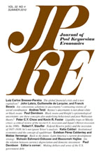
JOURNAL OF POST KEYNESIAN ECONOMICS
Scope & Guideline
Innovating Economic Understanding Through Rigorous Scholarship.
Introduction
Aims and Scopes
- Post-Keynesian Economic Theory:
The journal emphasizes the exploration and development of Post-Keynesian economic theories, particularly those related to effective demand, market dynamics, and the role of uncertainty in economic decision-making. - Financial Instability and Minskyan Analysis:
A core focus is on the analysis of financial instability, drawing on Hyman Minsky's theories to examine the relationship between financial systems and economic cycles. - Empirical Investigations:
The journal encourages empirical research that applies Post-Keynesian theory to real-world economic issues, using data-driven approaches to validate theoretical claims. - Social and Economic Policy:
There is a consistent focus on the intersection of economic theory and social policy, particularly concerning issues of inequality, poverty, and the impact of government interventions. - Global Economic Issues:
The journal addresses global economic challenges, particularly in developing and emerging economies, providing insights into how Post-Keynesian economics can inform policy responses.
Trending and Emerging
- Financialization and Its Impacts:
Research increasingly focuses on the effects of financialization on economic stability, investment, and income distribution, reflecting concerns about how financial markets influence the real economy. - Inequality and Economic Policy:
There is a growing body of work addressing the relationship between economic policy and inequality, particularly in the context of fiscal measures, social safety nets, and their effectiveness in mitigating disparities. - Climate Change and Economic Policy:
Emerging themes include the intersection of climate change and macroeconomic policy, exploring how sustainable development can be integrated into economic frameworks and the implications for investment and growth. - Post-COVID Economic Recovery:
The journal has seen an uptick in articles analyzing economic recovery post-COVID-19, focusing on inflation, employment, and the role of government intervention in stabilizing economies. - Gender and Economic Dynamics:
A notable trend is the increasing integration of gender analysis within economic frameworks, examining how gender inequality intersects with economic policies and labor market dynamics.
Declining or Waning
- Classical vs. Post-Keynesian Debates:
There seems to be a waning interest in direct comparative analyses between Classical and Post-Keynesian economic theories, as researchers focus more on developing Post-Keynesian frameworks rather than contrasting them with classical perspectives. - Monetary Policy Mechanisms:
Discussions specifically about traditional monetary policy mechanisms, such as interest rate adjustments, appear less frequently, with more emphasis now placed on unconventional monetary policies and their implications under financialization. - Purely Theoretical Constructs:
There is a noticeable decline in papers that focus solely on theoretical constructs without empirical analysis, as the journal trends towards integrating theory with practical applications and empirical data. - Historical Economic Analysis:
While historical perspectives have been important, the focus on historical economic analysis, especially in the context of classical economic thought, has diminished as contemporary issues and empirical studies take precedence.
Similar Journals

INTERNATIONAL ECONOMICS AND ECONOMIC POLICY
Connecting Theory and Practice in International EconomicsINTERNATIONAL ECONOMICS AND ECONOMIC POLICY, published by Springer Heidelberg, is a pivotal journal in the field of economics, focusing on both theoretical and empirical research that addresses pressing international economic issues. With an ISSN of 1612-4804 and an E-ISSN of 1612-4812, this journal has been a reliable source of insights since its inception and is poised for continuous growth, converging its themes from 2005 to 2024. Ranked in the Q2 category of Economics and Econometrics in 2023, it stands at a commendable 63rd percentile among similar journals, emphasizing its significance and impact in the academic community. Located in Heidelberg, Germany, the journal provides an access portal for researchers, professionals, and students to engage with cutting-edge economic analyses that inform policy and practice globally. By publishing original articles, reviews, and policy discussions, INTERNATIONAL ECONOMICS AND ECONOMIC POLICY plays a crucial role in shaping the discourse within the global economics landscape.
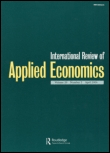
International Review of Applied Economics
Illuminating Contemporary Economic ChallengesInternational Review of Applied Economics is a leading journal dedicated to the dissemination of innovative research in the fields of economics and econometrics. Published by Routledge Journals, a renowned name in academic publishing under Taylor & Francis Ltd., this journal has established itself as a key resource for scholars, practitioners, and decision-makers. With an impressive Q2 ranking in the category of Economics and Econometrics, and positioned in the 70th percentile based on Scopus rankings, it provides a platform for high-quality, peer-reviewed articles that address contemporary economic issues. The journal aims to facilitate the understanding of applied economic theory and practice, and it accepts a diverse range of contributions including empirical studies, theoretical analyses, and methodological advancements. Operating from the United Kingdom, it has been a significant contributor to the academic dialogue since its inception in 1987, fostering knowledge exchange through rigorous scholarship. Researchers, professionals, and students alike will find valuable insights that inform policy-making and economic strategy in its pages.

Prague Economic Papers
Empowering Economists with Cutting-Edge ResearchPrague Economic Papers is an esteemed scholarly journal dedicated to the fields of Economics, Finance, and Econometrics, published by UNIV ECONOMICS-PRAGUE. With its ISSN 1210-0455 and E-ISSN 2336-730X, this journal serves as a vital platform for innovative economic research and theoretical advancement. Operating from the scenic backdrop of the Czech Republic, Prague Economic Papers is recognized in Scopus with rankings that place it in quartile Q4 for Economics and Econometrics, as well as Q3 for Finance, reflecting its growing impact in the academic sphere. Though the journal does not currently offer open access, it ambitiously covers a wide expanse of economic theories and empirical studies, contributing significantly to the evolution of economic thought from 2008 to 2024. Researchers, professionals, and students alike will find this journal essential for accessing critical insights and methodologies that shape contemporary economic discourse.
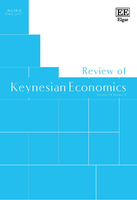
Review of Keynesian Economics
Exploring the Evolution of Economic ThoughtReview of Keynesian Economics, published by Edward Elgar Publishing Ltd, stands as a pivotal platform for scholarly discourse within the Economics and Econometrics field. With its ISSN 2049-5323 and E-ISSN 2049-5331, the journal has cultivated a robust reputation since its inception in 2012, recently earning recognition as a Q2 journal in its 2023 category rankings. The journal aims to delve into contemporary issues through the lens of Keynesian theory, fostering innovative research and critical analysis that challenges prevailing economic paradigms. Although the journal features no open access options, its rich repository of peer-reviewed articles provides invaluable insights for researchers, professionals, and students alike, making it a staple resource for those keen on exploring the evolving landscape of economic thought. With a Scopus rank of 300/716 in the realm of Economics, this journal occupies a notable position, reflecting its continued relevance and impact within the academic community.

JOURNAL OF ECONOMICS AND FINANCE
Advancing economic insights and financial innovations.JOURNAL OF ECONOMICS AND FINANCE, published by SpringerNature, is a leading academic journal that has been addressing critical issues in the fields of economics and finance since its inception in 1992. With an ISSN of 1055-0925 and an E-ISSN of 1938-9744, this journal offers scholars a platform to share their groundbreaking research and insights, contributing to the advancement of economic theory and financial practices. Although it operates under a traditional access model, the journal maintains a reputable standing within the academic community, evidenced by its 2023 Quartile ranking of Q3 in both Economics and Econometrics as well as Finance. Its Scopus ranking further reflects its relevance, securing positions of #355/716 and #159/317 in the respective categories. The journal aims to foster a comprehensive understanding of economic dynamics and financial innovations, making it an invaluable resource for researchers, educators, and practitioners who seek to explore contemporary trends and challenges within these disciplines.

Gospodarka Narodowa-The Polish Journal of Economics
Fostering collaboration through open access economics research.Gospodarka Narodowa - The Polish Journal of Economics is a prestigious, peer-reviewed journal dedicated to advancing knowledge in the field of economics. Published by SZKOLA GLOWNA HANDLOWA, KOLEGIUM ANALIZ EKONOMICZNYCH, this journal has been an essential resource since its inception in 2000, providing open access to its valuable research findings to foster academic collaboration and accessibility. With a focus on contemporary economic issues, policies, and trends, the journal serves as a crucial platform for scholars, practitioners, and students alike to explore innovative economic theories and applications, both within Poland and globally. By promoting critical analysis and empirical research, Gospodarka Narodowa contributes significantly to the discourse in economic science, making it a vital resource for anyone interested in this dynamic field.
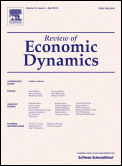
REVIEW OF ECONOMIC DYNAMICS
Shaping Economic Theory through Empirical ResearchREVIEW OF ECONOMIC DYNAMICS, published by Academic Press Inc, Elsevier Science, is a leading academic journal in the field of economics and econometrics, holding a distinguished Q1 ranking in its category as of 2023. With an impactful focus on the theoretical and empirical analysis of dynamic economic systems, the journal seeks to advance our understanding of economic dynamics through innovative research that addresses contemporary issues and policy implications. The journal boasts a significant history of contributions from renowned scholars since its inception in 1998, and will continue to publish through 2025. Although it does not currently offer open access options, the journal serves as a crucial resource for researchers, professionals, and students who are keen to explore and engage with the latest findings in economic theory and practice. With a current Scopus rank of #280 out of 716 in the Economics and Econometrics category, the REVIEW OF ECONOMIC DYNAMICS remains an invaluable platform for scholarly discussion and insight into the complexities of economic behavior.
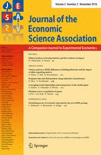
Journal of the Economic Science Association-JESA
Innovating Ideas, Transforming EconomiesJournal of the Economic Science Association (JESA), published by SPRINGER, stands as a pivotal platform in the realm of economic research, focusing on innovative theories and methodologies that challenge conventional economic paradigms. With its ISSN 2199-6776 and E-ISSN 2199-6784, JESA fosters a rigorous academic environment for scholars, practitioners, and students to exchange ideas and findings that shape our understanding of economic phenomena. Although the journal is not open access, it is committed to disseminating high-quality research that contributes to the economic sciences, making meaningful impacts on both policy and practice. Hailing from its esteemed office at One New York Plaza, Suite 4600, New York, NY, the journal aims to enhance the visibility of groundbreaking research and encourages submissions that delve into diverse aspects of economics. Join the intellectual discourse within its pages to contribute to the advancement of economic knowledge and practice.
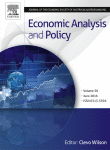
Economic Analysis and Policy
Fostering Excellence in Economic Research and PracticeEconomic Analysis and Policy is an esteemed academic journal published by ELSEVIER, dedicated to advancing the field of economics and econometrics since its inception in 1970. Based in the Netherlands, this journal plays a pivotal role in disseminating high-quality research that addresses contemporary economic issues and policy challenges. With an impressive Q1 ranking in both the Economics and Econometrics categories, and recognition in the top 91st percentile of Scopus rankings, it is a leading platform for scholars, professionals, and students seeking to contribute to and engage with the evolution of economic thought. The journal does not currently operate on an open access model, allowing it to maintain rigorous peer-review standards that ensure the integrity and impact of published research. As a vital resource for anyone interested in the intersection of theory and policy in economics, Economic Analysis and Policy fosters a community committed to rigorous analysis and innovative solutions in the economic domain.

Applied Economics Journal
Unlocking real-world solutions with innovative economic research.Applied Economics Journal is a premier academic publication dedicated to the advancement and dissemination of research in the field of applied economics. Published by Kasetsart University, Faculty of Economics, this journal serves as a vital platform for scholars, professionals, and students eager to explore current economic theories and their practical applications in diverse contexts. With its Open Access policy, the journal ensures that high-quality research is accessible to a global audience, encouraging knowledge sharing and collaboration. Although the journal is in its early stages with a developing HIndex, it is poised to become a key resource in the economic research community, fostering innovative approaches to real-world economic challenges. The journal welcomes submissions that delve into various aspects of applied economics, aiming to enhance understanding and contribute to policymaking and economic strategies across different sectors.